Key takeaways:
- Brewing courses offer hands-on experience and expert guidance, fostering creativity and camaraderie among students.
- Key skills developed through brewing include precision in measurements, creative experimentation with flavors, and a deep scientific understanding of fermentation.
- Continuing education allows brewers to explore new trends, refine techniques, and adapt to advancements in brewing science.
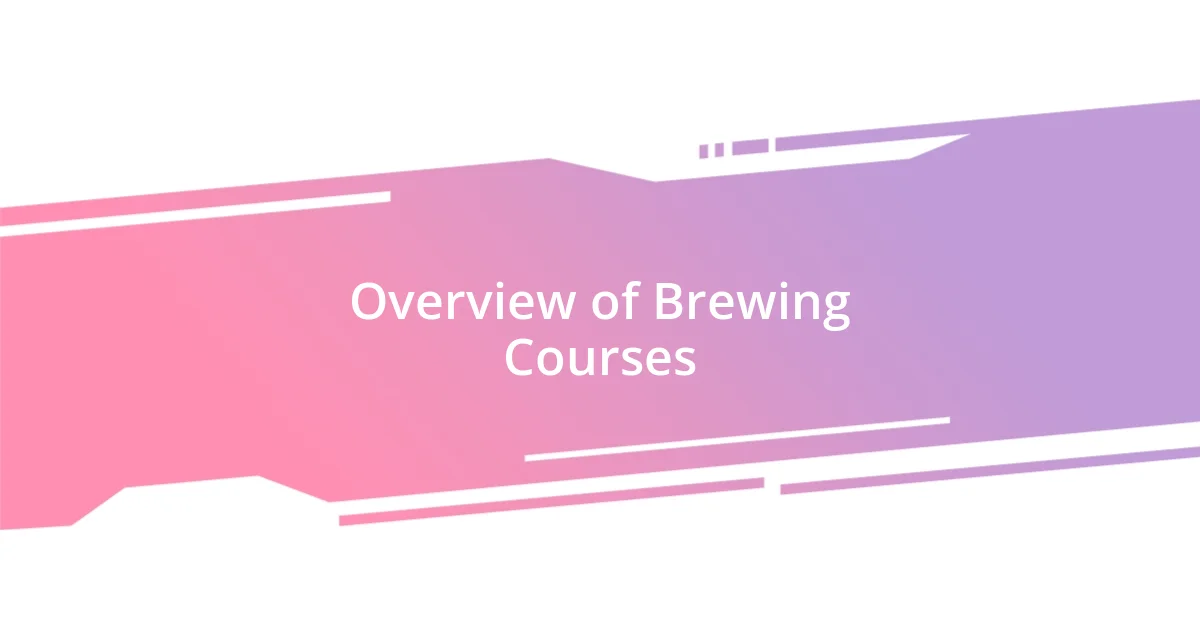
Overview of Brewing Courses
Brewing courses come in various formats, from hands-on workshops to online classes, catering to everyone from aspiring homebrewers to industry professionals. I remember my first classroom experience, surrounded by eager students all excited to learn the art of brewing; we shared stories and techniques that really created a sense of community. Isn’t it fascinating how a shared passion can bring people together?
Many courses also delve into the science behind brewing, discussing ingredients, fermentation, and the brewing process itself. I can still recall the moment I first understood the role of yeast—I felt like I had unlocked a secret! The way it transforms simple ingredients into delicious beer is nothing short of magical. Have you ever pondered how something like yeast can make such a difference?
Ultimately, a good brewing course not only teaches you practical skills but also inspires creativity and experimentation. I’ve tried my hand at creating unique flavors, and let me tell you, nothing compares to sipping your own brew and knowing you were part of every step. Have you thought about what kind of beer you’d love to create?
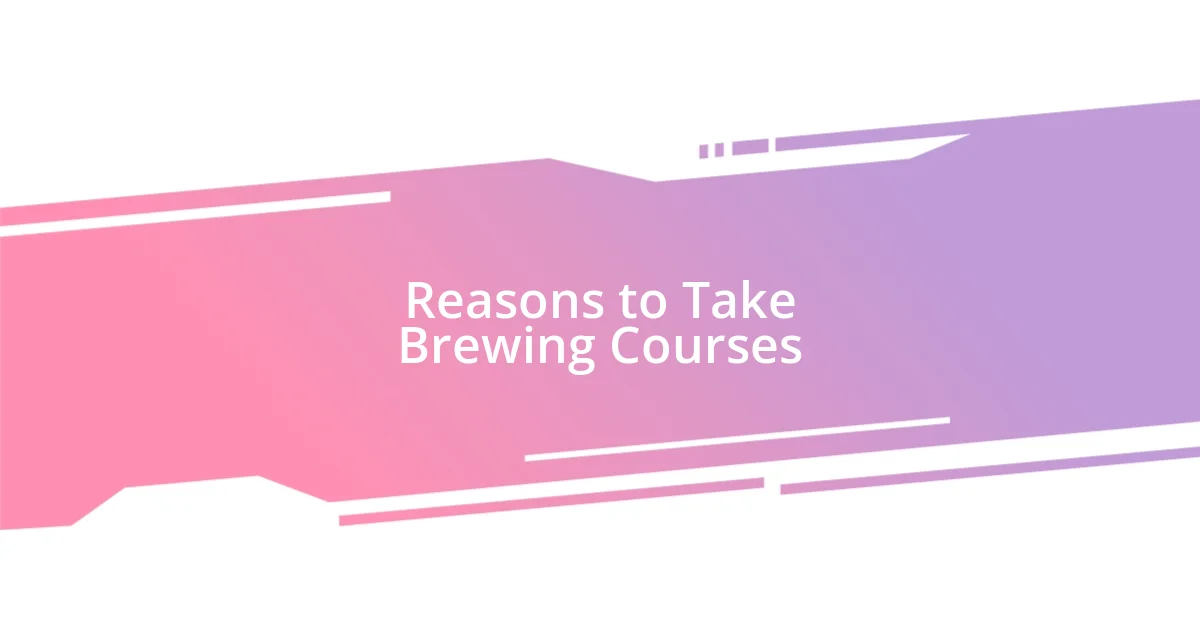
Reasons to Take Brewing Courses
Taking brewing courses can profoundly enhance your understanding and appreciation of the craft. I’ve often found that the immersive experience allows students to ask questions and make mistakes in a supportive environment. The thrill of brewing alongside others, each contributing different ideas, creates an atmosphere of camaraderie that’s difficult to replicate elsewhere.
Here are some compelling reasons to consider enrolling in a brewing course:
- Expert Guidance: Learning directly from experienced brewers can provide you with insights that books and videos just can’t capture.
- Hands-on Experience: Practical brews emphasize real-world skills, allowing you to taste your progress.
- Networking Opportunities: Meeting fellow enthusiasts and professionals can lead to valuable connections in the brewing community.
- Understanding Ingredients: Deep dives into each component of brewing help you appreciate the nuances of flavor profiles.
- Creativity Unleashed: Courses often encourage you to experiment, pushing boundaries on what you thought beer could be.
I remember my first class when we were encouraged to try adding unexpected ingredients like hibiscus and orange zest. The excitement that buzzed through the room was palpable; we all couldn’t wait to see how our creations turned out!
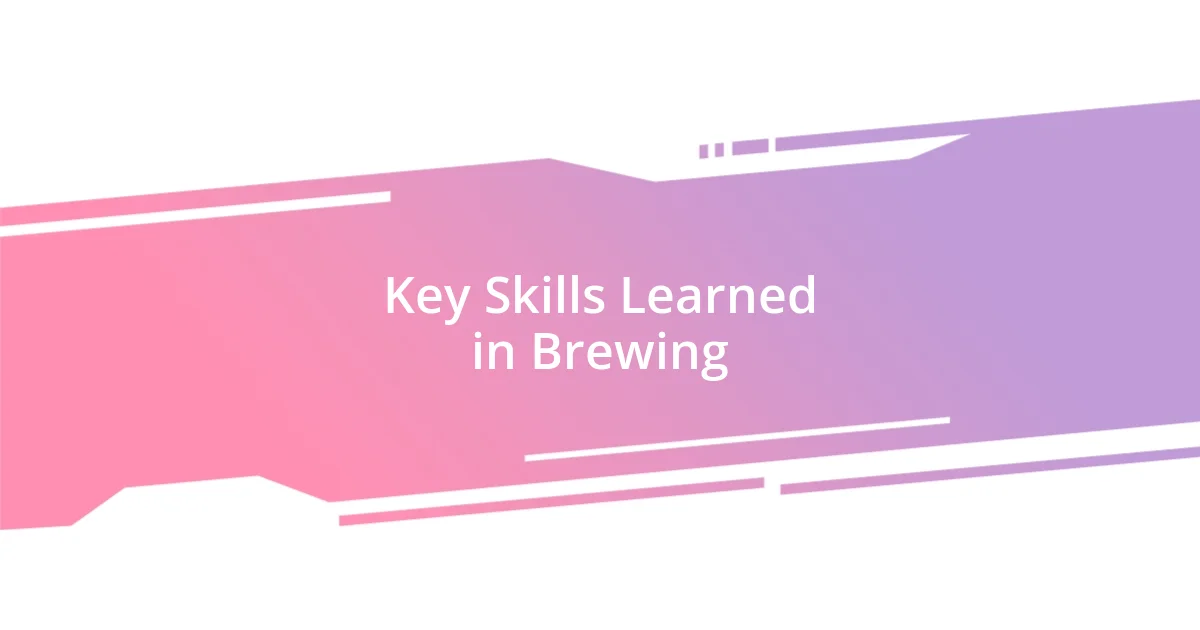
Key Skills Learned in Brewing
Brewing cultivates a variety of essential skills that I found incredibly invaluable. One of the most critical skills is precision and attention to detail. From measuring ingredients accurately to managing fermentation temperatures, every little factor can affect the final product. I vividly remember my first brew day when a simple miscalculation led to a beer that was too bitter. It was a humbling experience that taught me to respect the process and the craft.
Additionally, brewing courses nurture creativity and innovation. After taking one class, I decided to experiment with barrel-aging and unexpected flavor combinations. The thrill of seeking out new ingredients and testing various techniques to achieve my ideal flavor profile sparked a passion that I never knew I had. Can you imagine the excitement when you finally nail that perfect brew?
Understanding the science behind brewing is another key takeaway. I used to think it was all about throwing ingredients together, but learning about the chemistry of brewing unfolded a new layer of appreciation for the craft. For instance, observing how different yeast strains impact aroma and taste opened my eyes to endless possibilities. This grasp of theory, paired with practical application, truly enhances the brewing experience.
| Key Skills | Description |
|---|---|
| Precision | Attention to detail in measuring ingredients and managing fermentation processes. |
| Creativity | Encourages experimentation with flavors and brewing techniques. |
| Scientific Understanding | Deep knowledge about the fermentation process and ingredient interactions. |
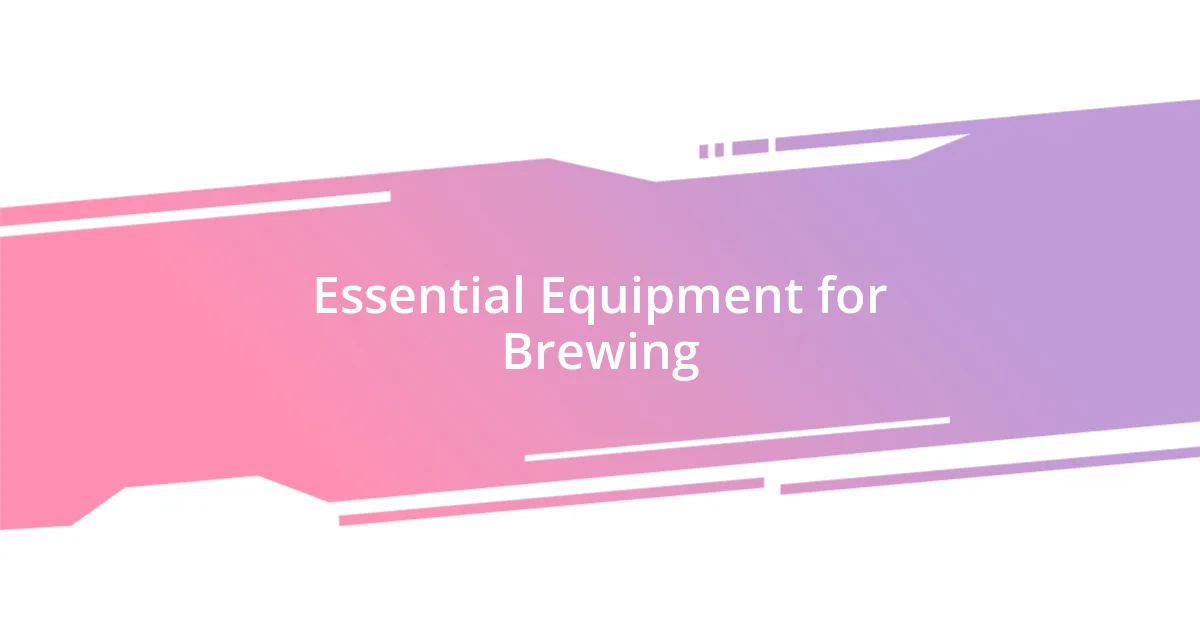
Essential Equipment for Brewing
Every brewer needs the right tools to create their masterpiece. One of the first items I invested in was a quality fermenter. I remember unboxing mine and feeling a rush of excitement—this was the home for my first brew! A good fermenter, preferably with an airlock, helps manage carbon dioxide release while keeping unwanted bacteria at bay. It’s not just a vessel; it’s a crucial part of the brewing journey.
Temperature control is another essential piece of equipment that can’t be overlooked. I distinctly recall a brew that went awry due to fluctuating temperatures. The yeast struggled, and rather than the crisp lager I aimed for, I ended up with something far more unrefined. A reliable thermometer or a temperature-controlled fermentation chamber transforms the brewing experience, ensuring your yeast thrives within the optimal range. Have you ever thought about how much a simple gadget could impact your final product?
Lastly, I can’t stress enough the importance of quality brewing equipment like a good set of brewing scales and a hydrometer. When I started, I relied on cups and spoons, which led to inconsistent brews that left me frustrated. The moment I switched to precise measurements, the taste of my beer improved dramatically. A hydrometer, on the other hand, helped me track fermentation progress, allowing me to grasp the science behind the bubbles. It’s fascinating how the right equipment not only boosts efficiency, but it also builds confidence in your brewing skills. Wouldn’t you agree that relying on accurate tools helps you unleash your brewing potential?
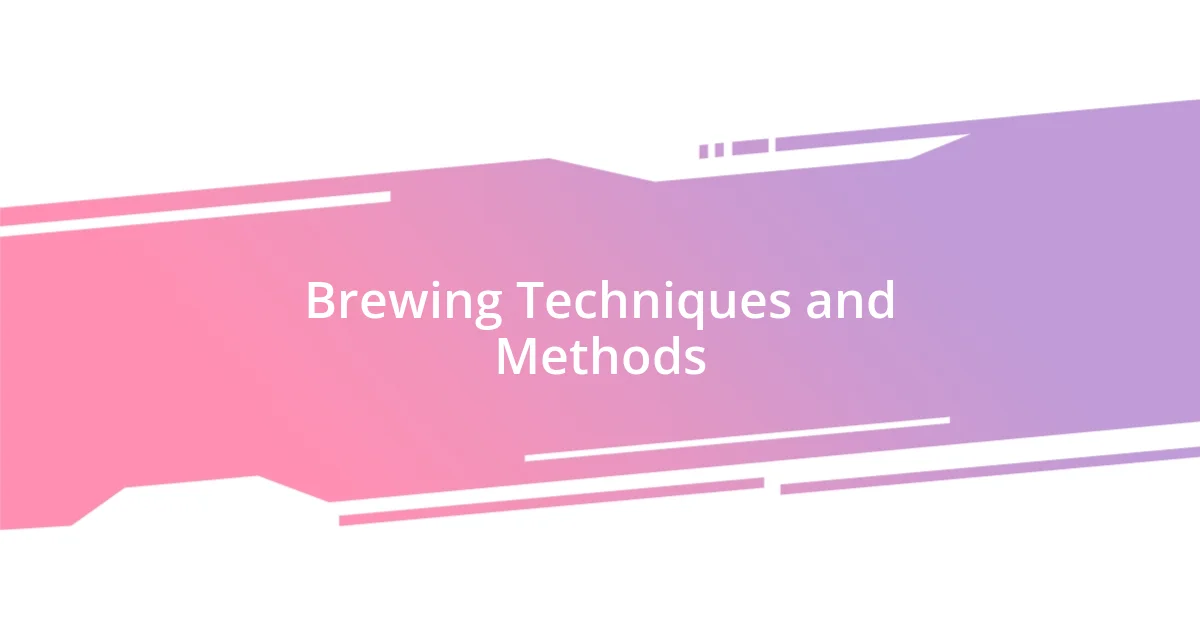
Brewing Techniques and Methods
Brewing techniques have a profound impact on the outcome of your beer. One time, I opted for a traditional method called “decoction mashing.” It’s a process where part of the mash is boiled and returned to raise the overall temperature. I was amazed at how this technique developed a richer malt flavor in my beer, showcasing just how powerful brewing methods can be. Have you ever tried a method that transformed the taste of your brew?
Another fascinating technique I delved into is dry hopping. Adding hops during fermentation instead of the boil creates a vibrant aroma without unnecessary bitterness. I’ll always remember my first attempt, when my kitchen filled with the fragrant notes of hops, making the whole brewing process feel even more enchanting. It’s moments like these that make you appreciate the art of brewing at a deeper level. Isn’t it incredible how a simple tweak can elevate your entire brewing experience?
Learning the importance of fermentation timing has also been a game-changer for me. Early on, I had a batch that I rushed to bottle, thinking it was ready. Unfortunately, my impatience led to over-carbonation and exploding bottles—a lesson learned the hard way! Now, I relish the patience required to let fermentation complete its magic, yielding cleaner, more balanced flavors. This has taught me that sometimes in brewing, as in life, good things truly come to those who wait. Have you ever experienced the rewards of giving your brew the time it needs?
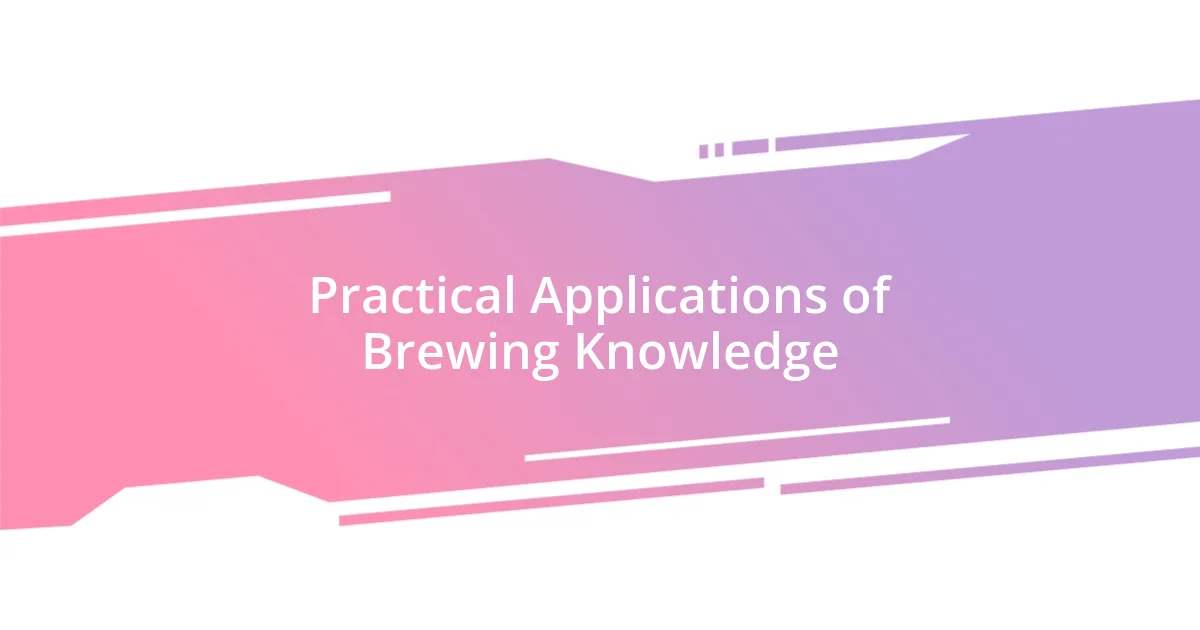
Practical Applications of Brewing Knowledge
One practical application of brewing knowledge I’ve found invaluable is understanding the role of water chemistry. During one of my early brewing sessions, I neglected to adjust my water profile, leading to a flat-tasting beer. Once I started experimenting with minerals like calcium and sulfate, it was like a light bulb went off. The moment I tasted a well-balanced brew, I realized how much water can change the entire experience. Have you considered how your local water might be impacting your brews?
Another significant aspect is the value of recipe formulation. I recall the excitement of crafting my first original recipe, only to be greeted by a muddled flavor profile. Through courses, I learned the importance of balancing malt, hops, and yeast. Now, I meticulously sketch out my recipes, and let me tell you—the sense of achievement when a brew matches my vision is unparalleled. Have you ever felt that thrill of creating something uniquely yours?
Moreover, mastering the meticulous nature of sanitation has saved me countless batches. I still remember the sinking feeling when I discovered an entire brew infected with off-flavors. Now, I approach sanitation like a sacred ritual, ensuring that everything from my tools to my fermenter is spotless. This practice not only prevents spoilage but also has given me peace of mind during the brewing process. Isn’t it rewarding to know that with a clean environment, your hard work won’t go to waste?

Continuing Education in Brewing Skills
Continuing education in brewing has been a transformative journey for me. I vividly recall attending a workshop focused on advanced brewing techniques, where I met fellow enthusiasts who shared their passion and knowledge. Their insights inspired me to explore new styles and methods, ultimately pushing my brewing skills to new heights. How has connecting with other brewers influenced your approach?
One of the most rewarding aspects of ongoing education is the opportunity to tackle emerging trends in the brewing world. I still remember the buzz around sour beer production during a seminar I attended. Diving into the world of wild yeast and bacteria opened a whole new facet of brewing for me. Have you ever found yourself excitedly experimenting with a trend, only to discover a newfound favorite in the process?
Participating in various courses has not only refined my technique but also reinforced the importance of adaptability. I had a moment of realization when a mentor emphasized the significance of understanding brewing science. This led me to experiment with various yeast strains beyond the traditional ones I was familiar with. The diverse profiles I discovered added depth to my brews that I hadn’t imagined possible. Isn’t it fascinating how one lesson can shift your entire brewing perspective?














